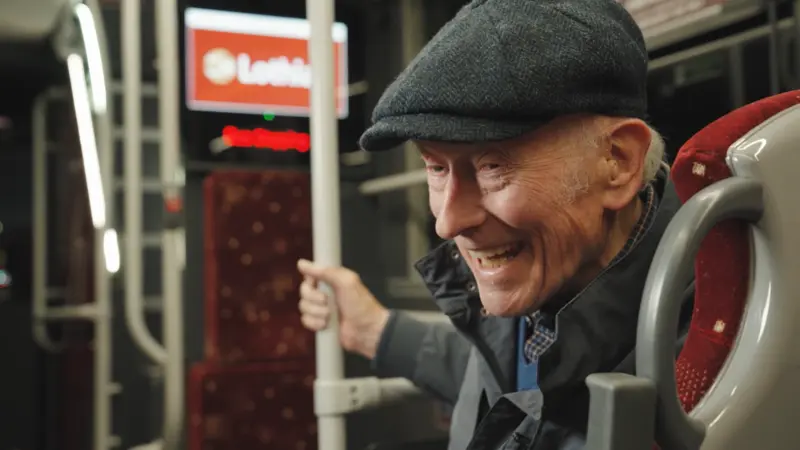Black History Month – Professor Sir Geoff Palmer KBE, KT, CD, OBE

In honour of Black History Month, Age Scotland is delighted to feature a contribution from Professor Sir Geoff Palmer KBE, KT, CD, OBE.
UK Black History Month started over 30 years ago. It was designed to show the contribution of Black people to society. The general view is that this education should not only be based in October, it should spread over the year. However, it has been said October coincides with the beginning of the new terms of schools and institutions of higher education.
Although I retired from my teaching career in 2005 at Heriot-Watt University, I retain contact as Chancellor. In terms of my contribution to UK society as a Black migrant, this goes back to British history of chattel slavery in Jamaica. One of my enslaved ancestors, who gave me some Scottish genes and the middle name Henry, was on the slave-owning Baptism list of the Scottish governor 6th Earl Balcarres, sent to Jamaica by Henry Dundas. Dundas had great political power at home in Britain and in the colonies. He was President of the profit making East India Company.
I was born in Jamaica. My late dear mother, a dress maker, migrated to London in 1951 and her savings paid my fares to join her in 1955. We are of the Windrush generation. On arrival in London in 1955 my mother was unaware that I could not go to work until I was 15 years of age. I was one month short of my 15th birthday. Instead of starting the delivery boys job in a shop she had arranged, the school authorities in Islington, London, said I had to attend school until I was 15 years old.
When I tried to register at a Comprehensive school, I was rejected as educationally sub-normal and was admitted later to a local Secondary school for a term. I was ‘not too bad’ at cricket and the local Grammar School effected my transfer... the headmaster said the school needed a cricketer. I left the Grammar School in 1958. I worked as a junior technician at London University which was close to the Notting Hill Gate race riots where wall signs said, “Keep Britain White”.
The Professor who employed me encouraged my community work where I helped migrants, including my mother, who were being threatened with eviction by landlords. My mother’s landlord turned off the water, I still have the bucket I used to collect water from our London neighbour in my garage. There were no community organisations to help them. The Professor also gave me time to gain the qualifications to enter University. In 1961 I entered Leicester University where I received an Hons Botany degree in 1964. Afterwards, I worked in the kitchen of a restaurant, the only job available, from June 1964 to December 1964. I was taken by the Heriot-Watt College (now a University) and Edinburgh University to do research on barley for a PhD. I started in 1965 and finished in 1967.
I worked in a Research Foundation in England, owned by brewers, from 1968 to 1977 and invented the barley abrasion process which made large profits for the British brewing industry and changed the scientific knowledge of the metabolism of the grain. I returned to the Heriot-Watt University as a lecturer in 1977 and set up the International Centre for Brewing and Distilling at the University before I retired in 2005. Many of my students own their own brewing companies.
During my career I travelled the world presenting scientific work on cereal grains. In Africa, this has helped small farmers to sell their local grain sorghum to large companies. I have also advised international companies such as Chivas Regal in Scotland, Heineken in Holland, Guinness in Ireland, Weissheimer in Germany, Coors in Colorado, served as Visiting research Professor in Japan and advised on the transfer of Cobra Company to the UK during a science and technology visit to India. Some of these companies have links with the industry in the Caribbean.
I have been involved with local charitable community work in Scotland for over 50 years and served on many committees. This includes widening knowledge, as chair of committees, that has confirmed Scotland’s economic involvement in Caribbean slavery. The Henry Dundas statue at St Andrew square, Edinburgh, is linked to this history and has a new plaque dedicated to slaves who suffered his gradual (time-less) abolition which benefited British slavers economically.
It was a great honour to unveil the Glasgow University and the Joseph Knight slavery plaques and to share this history with students, prisoners, pupils and community people. I contributed to the setting up of the Glasgow Refugees Council and would like to thank all those who have given me awards*.
I received the Scottish Knight of the Thistle Award recently, which was another honour to slaves who suffered. We are not different races, we are ‘one humanity’. Our different skin colours do not reflect ‘superior or inferior normalities or humanities’. This difference is the ‘Race lie’ of philosophers Hume and Kant (1750s) that must be rejected to end the inhumanity we call ‘racism’. We cannot change the past but we can change consequences such as ‘racism’ using education.
My recent health condition has limited my activities, but it is an honour to make this minor contribution to Black History Month 2024.
* Anti-racist plaque to late mother, George Square, Edinburgh University; Edinburgh Award; Pride of Scotland Award; Palmer Accommodation building for students, Leicester University; Palmer House, Citizen Advice Bureau, Penicuik, Scotland; Honorary Degrees.


